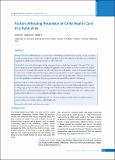Please use this identifier to cite or link to this item:
https://hdl.handle.net/20.500.14356/1989Full metadata record
| DC Field | Value | Language |
|---|---|---|
| dc.contributor.author | Pahari, D P | - |
| dc.contributor.author | Bastola, S P | - |
| dc.contributor.author | Paudel, R | - |
| dc.date.accessioned | 2023-06-05T06:07:44Z | - |
| dc.date.available | 2023-06-05T06:07:44Z | - |
| dc.date.issued | 2011 | - |
| dc.identifier.citation | PahariD. P., BastolaS. P., & PaudelR. (2011). Factors Affecting Retention of Child Health Card in a Rural Area. Journal of Nepal Health Research Council. https://doi.org/10.33314/jnhrc.v0i0.277 | en_US |
| dc.identifier.issn | Print ISSN: 1727-5482; Online ISSN: 1999-6217 | - |
| dc.identifier.uri | http://103.69.126.140:8080/handle/20.500.14356/1989 | - |
| dc.description | Original Article | en_US |
| dc.description.abstract | Abstract Background: The child health card is a tool used by Health Management Information System in Nepal. It contains records on immunization, vitamin A and a weight-for-age growth chart. The objective of this study was to identify the magnitude of and the factors affecting retention of child health card. Methods: A cross sectional descriptive design using quantitative methodology was applied. Divyapuri VDC was selected purposively and simple random sampling was applied to obtain a sample of 282 households with children between one to 36 months. Information was collected by interview with mothers of one to 36 months children and by observation of child health cards. Descriptive analysis was performed to assess the magnitude of retention of child health card. Then, bivariate analysis was performed; odds ratio and corresponding 95% confidence interval were used to test the significance of association. Logistic regression model was used for control of confounding. Results: Only 41% of the mothers produced child health card at the time of survey. For about 7% respondents, child health card was not issued and only 45% of the respondents who were issued child health card have retained it. Younger age group of the child, mothers living nearer to health facility, mothers with knowledge on use of child health card for recording immunization and recording growth monitoring; and mothers who were explained child health card by health worker were found significantly higher odds of retaining it. Conclusions: The retention of child health card was low in the study area. Health workers should be trained to educate mothers on retention and use of child health cards. Keywords: child health card, factors, retention. | en_US |
| dc.language.iso | en | en_US |
| dc.publisher | Nepal Health Research Council | en_US |
| dc.relation.ispartofseries | October;277 | - |
| dc.subject | Child health card | en_US |
| dc.subject | Factors | en_US |
| dc.subject | Retention | en_US |
| dc.title | Factors Affecting Retention of Child Health Card in a Rural Area | en_US |
| dc.type | Journal Article | en_US |
| local.journal.category | Original Article | - |
| Appears in Collections: | Vol 9 No 2 Issue 19 October 2011 | |
Files in This Item:
| File | Description | Size | Format | |
|---|---|---|---|---|
| 277-Article Text-275-1-10-20130822.pdf | Fulltext Download | 425.15 kB | Adobe PDF |  View/Open |
Items in DSpace are protected by copyright, with all rights reserved, unless otherwise indicated.
